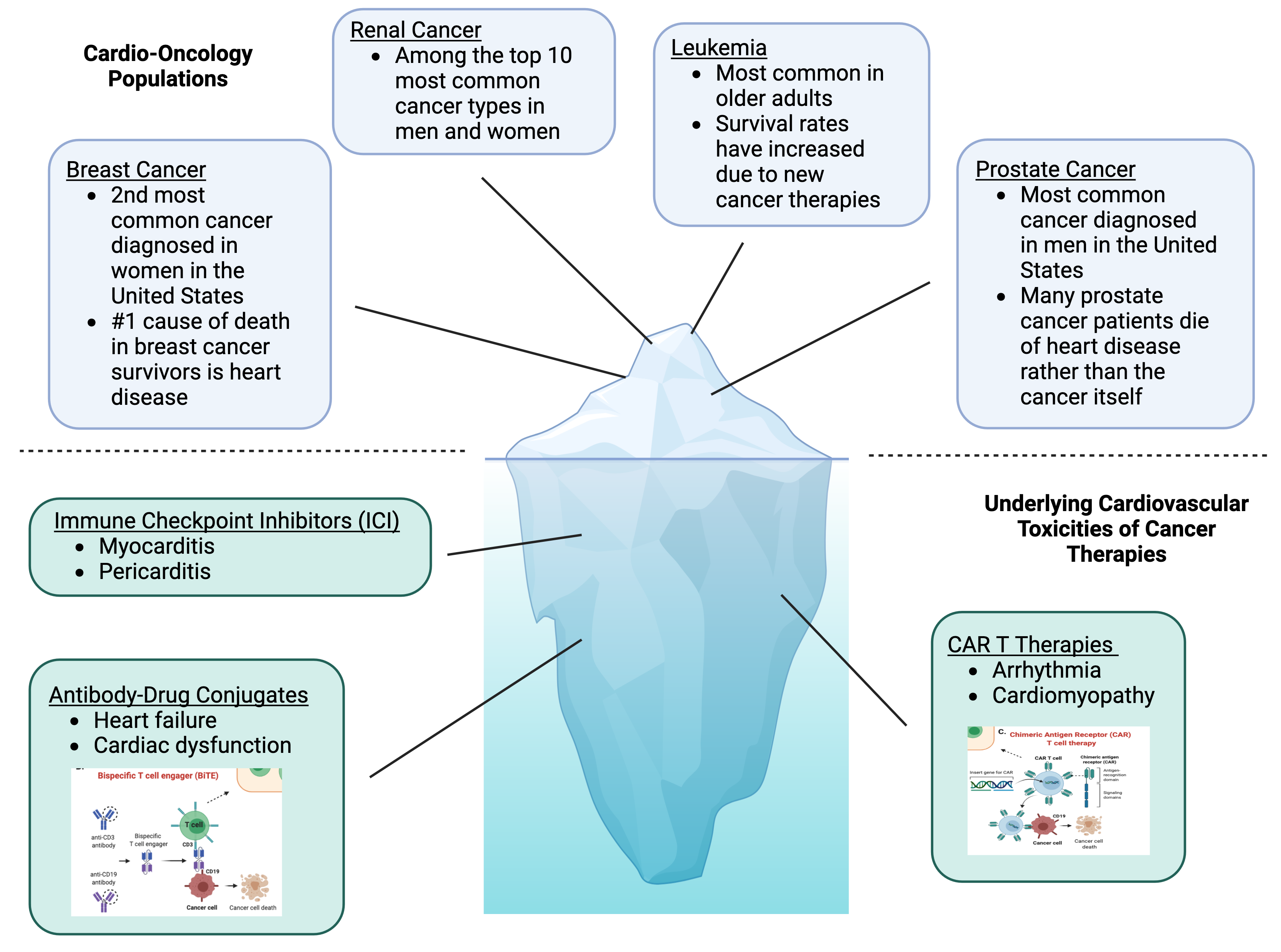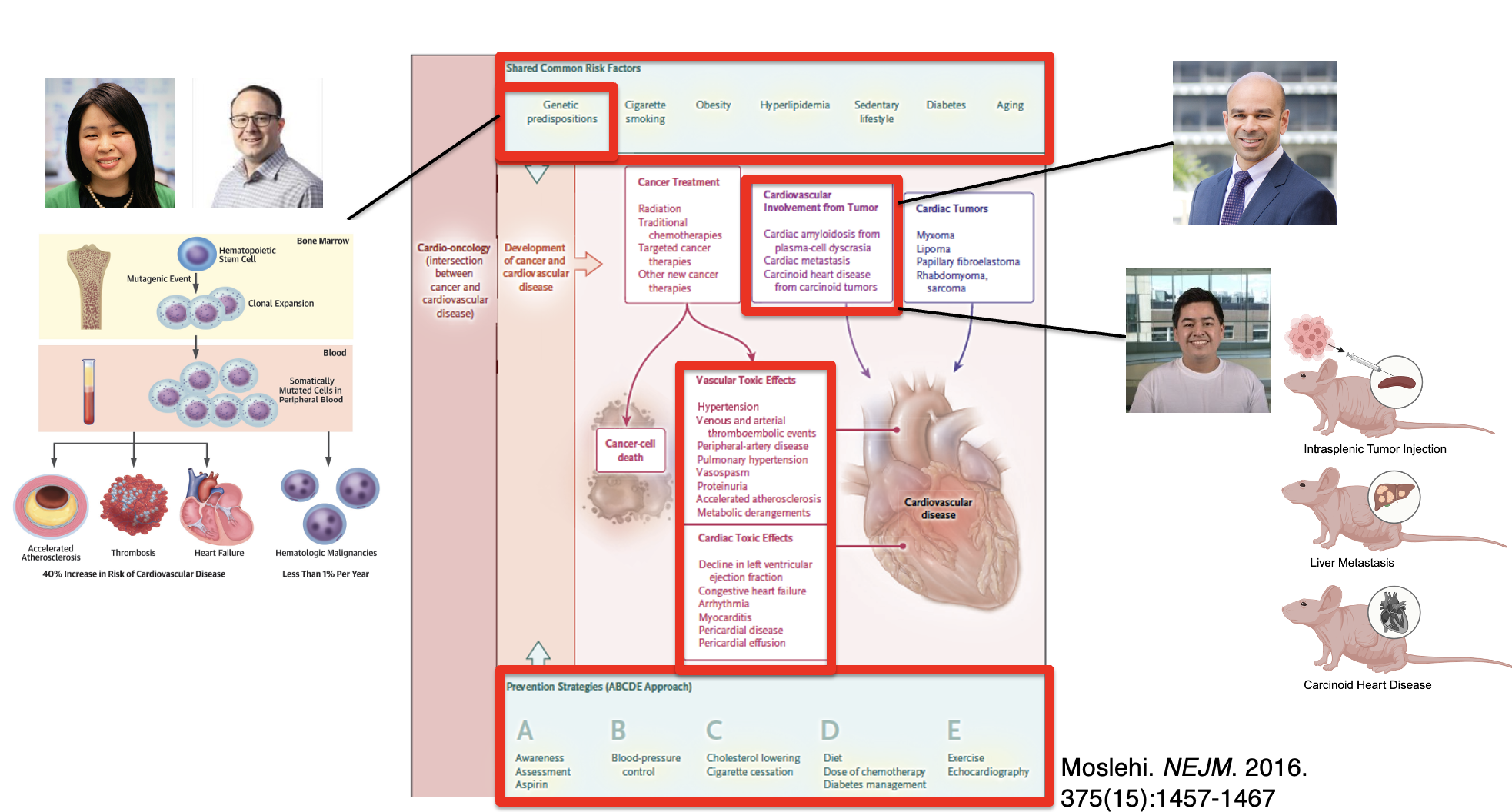Specific Cardio-Oncology Populations
Cardiovascular Toxicities in Cancer Populations
An iceberg represents what we know (above the water) and what we don't yet know (below the water) about cardiovascular and cardiometabolic toxicities of cancer treatments.

Prostate Cancer
Prostate cancer is the most common cancer diagnosed in men in the United States. About 1 in 7 men will be diagnosed with prostate cancer during their lifetime, and about 6 out of 10 are diagnosed in men aged 65 or older. Though prostate cancer is a common and serious disease, men diagnosed with prostate cancer generally die from other causes. Cardiovascular disease is common in prostate cancer patients and survivors, and many prostate cancer patients die of heart disease rather than prostate cancer itself. Furthermore, many treatments for prostate cancer further increase the risk of developing cardiovascular disease.
At UCSF, we have established a multi-disciplinary team, including close partnership with the cancer center, to identify and treat (and even prevent) heart disease in prostate cancer patient. Please also see the ABCDE schematic (below) for cancer survivors to help you improve your cardiovascular wellness.
Breast Cancer
Breast cancer is the second-most common cancer diagnosed in women in the United States. In the past decade, breast cancer survival rates have increased and death resulting from the cancer has been on the steady decline. Though women who survive breast cancer may face multiple health challenges, the number one cause of death in breast cancer survivors remains heart disease. In addition, traditional and newer breast cancer therapies can increase the risk of significant heart problems.
At UCSF, we have established a multi-disciplinary team, including close partnership with the cancer center, to identify and treat (and even prevent) heart disease in breast cancer patient. Please also see the ABCDE schematic for cancer survivors to help you improve your cardiovascular wellness.
Renal
Kidney cancer is among the top ten most common cancer types in both men and women. The most common type of kidney cancer is renal cell carcinoma (RCC). Different classes of drugs are used to treat kidney cancer, including immune checkpoint inhibitors, which activate the immune system and VEGF inhibitors (drugs such as sunitinib and axitinib) which inhibit blood flow to the tumors. Both VEGF inhibitors and immune checkpoint inhibitors are associated with cardiovascular complications.
At UCSF, we have established a multi-disciplinary team, including close partnership with the cancer center, to identify and treat (and even prevent) heart disease in kidney cancer patient. Our group also has established a multi-disciplinary team of researcher and physicians to advance research in this ares such that better care can be provided for our patients.
Chronic Myeloid Leukemia (CML)
Chronic Myeloid Leukemia (CML) is a type of cancer of the bone marrow and regarded as a cancer of the blood. CML tends to be diagnosed in older adults but can affect anyone. The survival rate of patients with CML has significantly increased thanks to the introduction of and use of kinase inhibitors. These new CML therapies are associated with various cardiovascular issues.
Our group at UCSF has done some of the most important research in cardio-oncology issues in CML patients. We have a multi-disciplinary team that works to ensure cardiovascular health in CML patients and survivors.
Survivorship
The UCSF cardio-oncology team is determined to help update cancer patients and cancer survivors about the risk of heart disease, while highlighting the important steps that cancer survivors can take to decrease their risk of subsequent heart diseases. The UCSF cardio-oncology program has developed an ABCDE approach to cardiovascular health.

This algorithm is based in part in recognition of the cardiovascular issues that may arise in cancer patients and has been adopted by national committees as part of their guidelines. Nevertheless, each patient has a unique risk of heart disease to personal specific cancer types and treatments. At UCSF, we advocate for a personalized approach to patient care.
